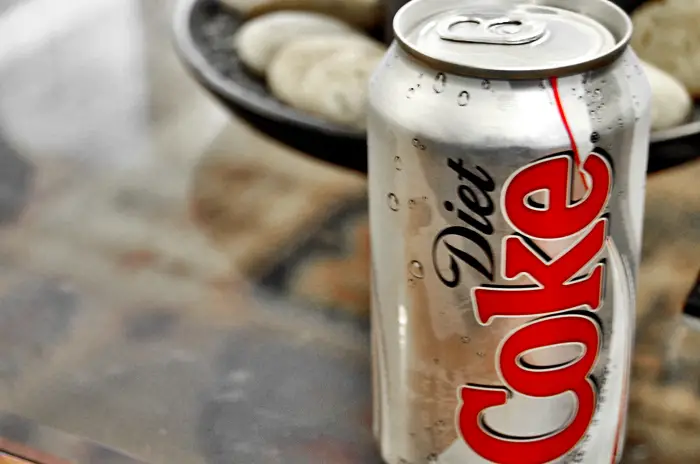The diet soda business is not exactly doing that well for many reasons, chief among them the scientific literature coming out condemning them as bad news for our health.
Most people know about the dozens of studies linking aspartame and other artificial sweeteners to serious health risks, but did you know that associating diet soda pop with weight loss is also essentially a huge scam according to recent literature?
It’s gotten so bad that a popular consumer group (U.S. Right to Know) recently sent letters to CEOS of the biggest soft drink companies in the world asking them to respond to several key studies showing that their products are not “diet” after all, and marketing them as such is the definition of hypocrisy.
The letter was sent to to Coca-Cola Co. CEO Muhtar Kent, PepsiCo Inc. CEO Indra Nooyi, and Dr. Pepper Snapple Group CEO Larry Young.
Why exactly is the marketing of these sodas as diet one of the biggest scams the world of food has ever seen? Let us count the ways.
8 Reasons Why “Diet” Sodas are a Huge Scam
The following are 8 studies showing how diet sodas can actually promote weight gain and contribute to obesity, taken from the letter:
- A 2010 Yale Journal of Biology and Medicine review of the literature on artificial sweeteners concludes that, “research studies suggest that artificial sweeteners may contribute to weight gain.”[1]
- A 2009 American Journal of Clinical Nutrition review article finds that the “addition of NNS [nonnutritive sweeteners] to diets poses no benefit for weight loss or reduced weight gain without energy restriction. There are long-standing and recent concerns that inclusion of NNS in the diet promotes energy intake and contributes to obesi犀利士
ty.”[2]
- A 2010 International Journal of Pediatric Obesity review article states that “Data from large, epidemiologic studies support the existence of an association between artificially-sweetened beverage consumption and weight gain in children.”[3]
- A 2013 Trends in Endocrinology and Metabolism review article finds “accumulating evidence suggests that frequent consumers of these sugar substitutes may also be at increased risk of excessive weight gain, metabolic syndrome, type 2 diabetes, and cardiovascular disease,” and that “frequent consumption of high-intensity sweeteners may have the counterintuitive effect of inducing metabolic derangements.”[4]
Epidemiological evidence suggests that artificial sweeteners are implicated in weight gain, as the letter noted. For example:
- The San Antonio Heart Study “observed a classic, positive dose-response relationship between AS [artificially sweetened] beverage consumption and long-term weight gain.” Furthermore, it found that consuming more than 21 artificially sweetened beverages per week – compared to those who consumed none, “was associated with almost-doubled risk” of overweight or obesity.”[5]
- A study of beverage consumption among children and adolescents aged 6-19 found that “BMI is positively associated with consumption of diet carbonated beverages.”[6]
- A two-year study of 164 children found that “Increases in diet soda consumption were significantly greater for overweight and subjects who gained weight as compared to normal weight subjects. Baseline BMI Z-score and year 2 diet soda consumption predicted 83.1% of the variance in year 2 BMI Z-score.” It also found that “Diet soda consumption was the only type of beverage associated with year 2 BMI Z-score, and consumption was greater in overweight subjects and subjects who gained weight as compared to normal weight subjects at two years.”[7]
- The U.S. Growing Up Today study of more than 10,000 children aged 9-14 found that, for boys, intakes of diet soda “were significantly associated with weight gains.”[8]
Will FDA, FTC Get Involved?
Earlier this spring the group also requested the FTC and FDA to stop Coca-Cola, Pepsi from using the term “diet” in their advertising and branding.
Texts of the U.S. Right to Know requests to FTC and FDA are available at:
FTC: http://usrtk.org/wp-content/uploads/2015/04/FTC-artificial-sweetener-letter.pdf
FDA: http://usrtk.org/wp-content/uploads/2015/04/FDA-artificial-sweetener-petition.pdf
While some might say the link is mostly due to people overeating when they consume diet soda, the evidence is pretty clear, chemically, this stuff does things to our bodies that directly contribute to us being obese, like destroying our gut bacteria.
And that’s just one reason why you should drop them like the bad habit they are as soon as you possibly can, and why someone should step in and put an end to the “diet” soda scam once and for all.
Nick Meyer is the author of ‘Dirt Cheap Weight Loss,’ a top selling book for Amazon Kindle on how to lose weight naturally. You can subscribe for more articles like these in your inbox by clicking here. You can also see a list of these studies by reading the official letter here.
Thanks for installing the Bottom of every post plugin by Corey Salzano. Contact me if you need custom WordPress plugins or website design.





